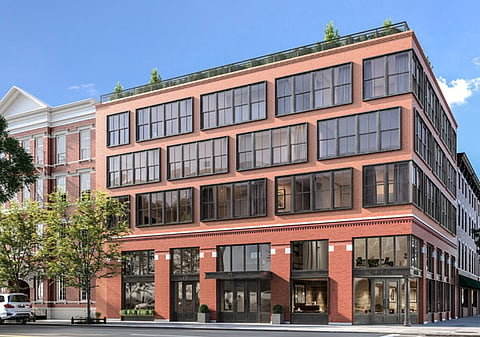SPOTLIGHT ON METTLE PROPERTY GROUP
The real estate market has always been a risky business to be in. During the economic recession of 2008, many in the industry suffered great deficits. Gerard Longo, Principal of Mettle Property Group, managed to survive the economic downfall by taking risks on major projects. Resident Magazine sat down with Gerard Longo who tells us about his journey from the journey of his financial challenges during the recession to his successful rise to the top.
RM: Did you always want to work in real estate?
GL: Looking back, I never thought I would be where I am today. My interest in real estate began in college when I bought my first investment property and doing commercial leasing. From there, I worked my way up the real estate ladder. Not only did I start flipping (renovating and selling) one to four family homes, I eventually built my way up to midrise buildings and super structures. Before I knew it, I was building hotels in cities like Miami and New York. This year we were approved for a dual branded Hilton Hotel in Long Island City, which included a Hampton Inn and a Homewood Suites. We are also involved in hospitality projects in Miami and have multiple commercial and residential projects in the works.
RM: What are you currently working on in Miami?
GL: 8995 Collins Avenue, which is a short distance from the Bal Harbour Shops. The location offers luxury beachfront condominiums designed by Thomas Juul-Hansen Architect in pre-development.
RM: Throughout your career you have stayed pretty true to yourself. As a developer how do you choose between a small project and large one?
GL: I am very proud of our accomplishments. We look at investments from a different perspective. Every job has to be solvent and has to make sense. Businesswise, it's very easy to fall in love with the sex appeal of a development. For example, it's easy to see a five-star hotel on the beach and say, "I would like to do that deal because of its stature;" but if it doesn't make business sense, you can get caught in a trap and that's where you make mistakes. In addition to our larger developments, we have a category that we call LSD, "Less Sexy Developments," which consists of smaller developments under ten million dollars. For example, a six-unit condominium development or a string of four three family homes. I'd rather do several of these projects and make more money and have less risk. The bigger the job, the more people involved, and the more site specific safety issues we need to be concerned with, which increases the price. You have all of these extra costs that you have to account for with these bigger projects as opposed to a simple smaller project. You need to make a return on your investment. If it has sex appeal, we certainly would love to work on the project, but, first and foremost, we have to protect the fiscal foundation of the job.
RM: What project are you most proud of?
GL: When the market crashed in '08 and '09, we were in the midst of launching The Pearline Soap Factory and The Fairchild, both in TriBeCa. The New York Times interviewed me and asked, "What would make you launch this project in this environment?" And it's true, but you can't plan for a recession when you purchase a property years in advance. That project represents every challenge and every obstacle possible. I was close to financial devastation; the banks froze every one of my accounts and were collapsing themselves to the FDIC. At one point, all of my projects were stalled. I had to do the only thing I could do, which was fight for my life. At the end of the day, they are two beautiful landmark buildings and the struggle I faced makes it a project that I won't forget.
RM: How did these projects end up doing?
GL: There were sixteen projects in the Tribeca area that were under development at the time. Out of sixteen, only two of them succeeded and they both happened to be projects I was involved with. The interesting thing is that it took a pound of flesh from me, but we still managed to turn a profit.
You have to put your mindset back to 2008 and 2009; people's stock portfolios were decimated and the idea of making any profit was out of the question, however we were able to achieve project completion and making a modest profit. When we were marketing the condos, I actually said to our broker, Raphael De Niro, "You know who the two luckiest people in the world are? The next two people that show interest in one of my buildings." At the time, I needed to sell the condos to raise money quickly and those two people were about to get a really great deal.
RM: You have two hotels, what else are you building?
GL: We are currently transforming 70 Henry St, which was previously the Brooklyn Heights Cinema, into a boutique collection of brand new luxury residences. The five-star property has approximately 1500 square feet of prime retail space facing Henry Street. We're also building that dual branded 290-key Hilton Hotel in Long Island City, which has approximately 20,000 square foot of retail space. The entire hotel complex with retail is almost a full city block. There's also a luxury condominium project on 90th and Collins Avenue on the beach in Miami

